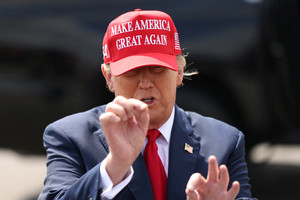When an Old Man Decides Not to Run for President After All

Even though Joe Biden or Donald Trump maintain sizable leads in their respective primary campaigns, neither man had a particularly good June. Biden continues to face questions about his age, most recently when he appeared to confuse Ukraine and Iraq on two separate occasions, and regarding his son Hunter, whose legal troubles continue to draw considerable public and media attention. Trump, meanwhile, continues to get indicted.
So while both continue to be prohibitive favorites for their party’s nominations, smart people on both sides of the aisle should be asking themselves what would happen if their probable standard-bearer were to decide not to go forward.
That conversation is louder among Democrats, for obvious actuarial reasons. Biden has repeatedly made it clear that he intends to seek reelection. But poll numbers showing pronounced voter discomfort with a man of his age seeking another term — and the medical realities that confront even the healthiest octogenarians — have led to ongoing speculation of where the Democrats would turn if the president were to step aside.
There is considerable nervousness in Democratic circles about Vice President Kamala Harris’ viability as a candidate, leading to a frenzy (albeit a quiet one) about other possible alternatives. But an even more basic question than who the party would nominate in Biden’s place is when the president would make such a momentous decision.
If Biden were to choose not to seek a second term by the first weeks of 2024, there would still be enough time for a full complement of candidates to enter the field, creating a large and competitive primary contest. The survivor would have demonstrated the political skills and built the support to mount a formidable general election campaign.
But if Biden were forced out of the race later in the year, say next March or April, it would no longer be possible for such a multi-candidate process to take place. As the election year calendar progressed, the possibility for Democrats to nominate anyone other than Harris would rapidly diminish.
Biden’s decision would be excruciating. Presidents simply don’t give up the job voluntarily once they’re in office. Biden also believes, with good reason, that he is the Democrat best equipped to defeat Trump. But the president must also recognize the risk that Harris would represent as the party’s nominee. The question is whether he is willing to take the chance of Trump returning to the White House if his own health does not hold up through next November.
Realistically, Biden has about six months to decide on his own terms. After that, the decision would be made for him— with daunting political implications.
In addition to Biden’s health, the worsening legal troubles that his son is facing could impact his thinking too. The president must know that most of Hunter’s problems would diminish (though not vanish) if his dad was not seeking re-election. Given the pain Joe Biden must feel over his son’s difficulties, it wouldn’t be surprising for this to play a role in his deliberations too.
There is one event that could make it much easier for Biden to forego the race: if Trump were not a candidate either. While there has been much more public focus on Biden’s age, it’s worth noting that Trump is only three years younger than the president and would also be in his 80s by the end of his term. Unlike Biden, who exercises daily, Trump is severely overweight and is known for his extremely unhealthy diet. It’s very plausible that he could be sidelined by a medical condition too.
The much more likely scenario for Trump’s departure from the race is not his health or his age, but his own legal challenges. His indictments have greatly strengthened his position in the Republican primary field, and combined with Ron DeSantis’ early struggles, his hold on the GOP nomination looks stronger than ever. But as special counsel Jack Smith shifts his attention from the Mar-a-Lago documents to the January 6 riots, Trump’s legal troubles could certainly have a more pronounced political impact. In addition to DeSantis, no shortage of other Republican contenders see that as their opportunity to supplant Trump.
The likelihood of a Biden-Trump rematch is strong. But there is no shortage of very qualified and extremely impatient politicians who would be happy to fill one of those two vacancies, should they occur. And we have witnessed much bigger surprises in recent years than the one that would occur if one or both of these men didn’t or couldn’t continue.
Want to talk about this topic more? Join Dan for his webinar "Politics In The Time of Coronavirus." Or read more of Dan’s writing at: www.danschnurpolitics.com.
Dan Schnur is a Professor at the University of California – Berkeley, Pepperdine University, and the University of Southern California, where he teaches courses in politics, communications and leadership. Dan is a No Party Preference voter, but previously worked on four presidential and three gubernatorial campaigns, serving as the national Director of Communications for the 2000 presidential campaign of U.S. Senator John McCain and the chief media spokesman for California Governor Pete Wilson. He has a Center bias.
This piece was reviewed and edited by Isaiah Anthony, Deputy Blog Editor (Center bias).

May 1st, 2024

May 1st, 2024

April 29th, 2024

April 29th, 2024